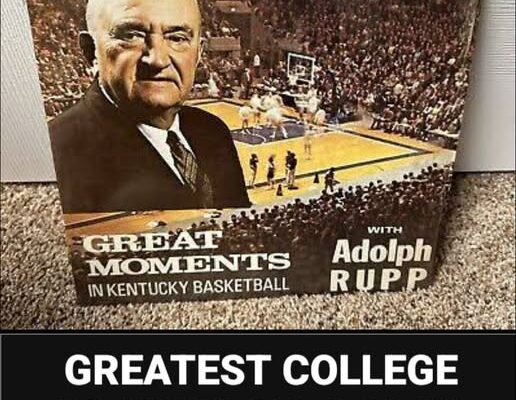Adolph Rupp: The Architect of a Basketball Kingdom and a Legacy Etched in the Heart of the Bluegrass
When speaking about college basketball’s pantheon of coaching legends, few names resonate with as much reverence and enduring influence as Adolph Rupp. His life and career represent more than just wins and championships; they embody a transformative era in basketball, a deep cultural imprint on the sport, and an enduring legacy woven into the very soul of the Bluegrass State. To understand Adolph Rupp is to appreciate a man who did more than coach basketball—he elevated the game, created a kingdom of champions, and inspired generations with a style, intensity, and commitment that changed college hoops forever.
Born on September 2, 1901, in Halstead, Kansas, Adolph Frederick Rupp’s journey to greatness began humbly but with an unmistakable drive and passion for sports. Raised on a farm, Rupp learned the value of hard work early on—qualities that would come to define his coaching style decades later. His early exposure to basketball came as a student at the University of Kansas under the legendary Phog Allen, a direct coaching descendant of James Naismith, the game’s inventor. This lineage instilled in Rupp a profound respect for basketball fundamentals and the evolving strategies that shaped the game’s early years.
Rupp’s time as a player and later as a high school coach laid the foundation for what would become a revolutionary approach to college basketball. When he accepted the head coaching position at the University of Kentucky in 1930, the program was far from the powerhouse it would become. Yet, Rupp’s vision was clear: build a dynasty, not just a team.
Adolph Rupp’s tenure at Kentucky spanned 42 years, during which he compiled an astonishing record of 876 wins against just 190 losses. But beyond the statistics lies a story of innovation, resilience, and an unyielding commitment to excellence. Rupp was a pioneer in crafting an aggressive, fast-paced style of play that emphasized precision shooting, rigorous defense, and strategic discipline. His teams were known for their relentless pressure and unshakable focus—a reflection of Rupp’s own personality.
Under his guidance, Kentucky became synonymous with success. Rupp led the Wildcats to four NCAA Championships (1948, 1949, 1951, and 1958), a testament to his ability to adapt and evolve over decades marked by changes in the sport’s rules and style. Each championship run wasn’t just a victory on the court; it was a symbol of Kentucky’s ascendance as the epicenter of college basketball excellence.
Rupp’s impact extended beyond the national stage to shape the entire Southeastern Conference (SEC). His dominance raised the competitive bar and inspired schools across the region to invest in their programs, thereby elevating the sport’s profile and intensity. The “Rupp Arena,” named in his honor, stands as a monument to his legacy, a place where countless legends have taken to the court, carrying forward the torch he first lit.
Adolph Rupp’s genius wasn’t limited to X’s and O’s; it lay in his ability to cultivate a culture of winning that transcended generations. He was known as a demanding coach who expected discipline, teamwork, and respect both on and off the court. His players were not just athletes but ambassadors of a proud tradition. Rupp believed in molding character as much as in honing skills, often emphasizing the importance of academics and integrity.
He once said, “The essence of coaching is getting players to work together.” This simple but profound principle underpinned everything he did. Rupp’s teams were cohesive units where individual talent was celebrated only when it served the collective goal. This philosophy created a legacy of players who not only achieved greatness on the court but also succeeded in life beyond basketball.
To fully grasp the magnitude of Adolph Rupp’s legacy, one must understand the historical and cultural backdrop against which he coached. College basketball in the mid-20th century was evolving rapidly—from a regional pastime to a nationally televised spectacle that captured the American imagination. Rupp was at the forefront of this transformation.
His success helped popularize the sport beyond traditional strongholds, fostering a fervent basketball culture in Kentucky and the broader South. The Bluegrass region, already steeped in pride and tradition, embraced basketball as a symbol of identity and community pride. Rupp’s Wildcats became a rallying point, uniting people across social and economic lines in shared enthusiasm.
At the same time, Rupp’s career was not without controversy. His tenure coincided with complex racial dynamics in the South. For many years, the University of Kentucky’s basketball program remained segregated, a fact that has led to significant reflection and reassessment of his legacy in modern times. However, Rupp did eventually recruit and coach African American players, breaking barriers and contributing to the sport’s ongoing evolution toward inclusivity
Rupp’s contributions to basketball strategy are still studied by coaches today. He was among the first to emphasize conditioning and practice rigor, recognizing that preparation was as crucial as talent. He popularized the use of set plays and man-to-man defense, adapting these tactics to the changing pace and physicality of the game.
Moreover, Rupp’s keen eye for talent and ability to develop players helped transform raw recruits into All-Americans and future NBA stars. His mentorship created a lineage of coaches who carried forward his principles, spreading his influence far beyond Lexington
Adolph Rupp’s “kingdom” was not built on fleeting success but on sustained excellence. His Wildcats dominated the college basketball landscape for decades, setting standards that remain benchmarks for programs today. His four NCAA championships were groundbreaking achievements at a time when the tournament was far smaller and more competitive regionally than it is now.
Yet, Rupp’s true kingdom was the culture and legacy he built—one where the pursuit of excellence became a way of life, where basketball was more than a game but a tradition passed down from generation to generation. This kingdom’s reach extends into every arena, every gym, and every fan’s heart who chants “Go Big Blue!”
When Adolph Rupp retired in 1972, he left behind a program that was a national powerhouse and a symbol of basketball excellence. More than just the records or championships, his legacy endures in the countless lives he touched—players, fans, coaches, and communities. Kentucky basketball remains one of the most storied programs in college sports, and that is a testament to the foundation he laid.
The Rupp Arena continues to be a cathedral of basketball, echoing the cheers of tens of thousands who have witnessed the drama and magic of college hoops. His name is synonymous with commitment, innovation, and an unrelenting pursuit of greatness.
Adolph Rupp’s story is one of vision and perseverance. He transformed a regional basketball program into a national dynasty and, in doing so, shaped the course of college basketball history. From the dusty courts of Kansas to the roaring crowds of Lexington, Rupp’s journey exemplifies the power of sport to inspire, unite, and elevate.
He did more than coach the game; he made it wonderful. He crafted a kingdom of champions, instilled a culture of excellence, and inspired generations to dream bigger and play harder. His legacy lives on, not just in trophies or records but in the very essence of college basketball and the heart of the Bluegrass.



